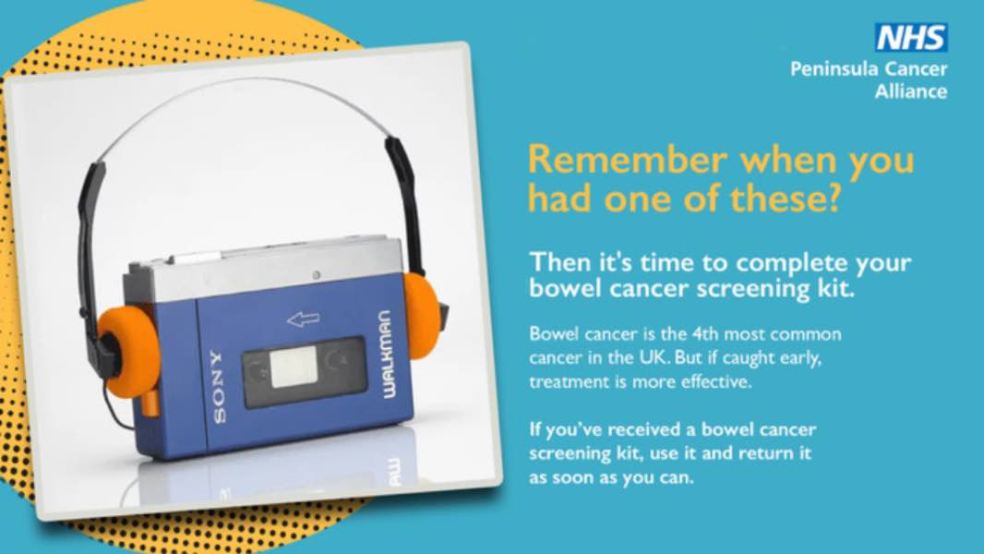
Peninsula Cancer Alliance asks people to ‘remember when…’ to boost bowel cancer early detection rates
The Walkman and a Chopper bike were staples of growing up in the 60s and 70s… and now, part of a rallying call to help save lives with a new campaign from the Peninsula Cancer Alliance
Launched today (Tuesday 5 November), Remember when… encourages people to complete and return their home bowel cancer screening kits to help catch signs of the disease early.
The campaign shines a spotlight on bowel cancer as the fourth most common cancer in the UK, with around 44,000 people being diagnosed each year.
It also urges people to look out for their kit when it arrives and to be aware of bowel cancer symptoms.
In England, everyone aged 54 to 74 years old who is registered with a GP is automatically sent a faecal immunochemical test (FIT) every two years. Individuals use the kit to collect a small sample of poo and send it back to a lab to test for signs of cancer.
The programme is gradually expanding so that those aged 50 to 53 will also be eligible for screening.
Now, the Peninsula Cancer Alliance is hoping to encourage more people to complete and return their kits through a nostalgia-driven campaign, with the message that if they can remember owning a Walkman or longing for the iconic chopper bike for example, then it could be time to complete their bowel cancer screening kit.
The NHS-led organisation is also urging anyone with symptoms of bowel cancer, such as blood when going to the toilet or stomach pains, to go to their GP to get checked out.
Among those supporting the initiative is bowel cancer patient Ché Osmond, who was diagnosed with the disease in April this year.
The dad-of-one from Falmouth went to see his doctor after experiencing mild stomach pain and noticing a small amount of blood in his poo.
Ché, 55, said: “Up until my diagnosis, I had always considered myself to be fit and healthy – I cycled to work every day and ate a balanced diet. Looking back, there were small signs that something wasn’t right though.
“For example, I started feeling more fatigued when cycling and I did notice a small amount of blood in my poo but I just assumed it was piles and thought nothing of it.
“Like most men, I put off going to the doctor and it was my wife who encouraged me to go and get myself checked out. At first, my GP suggested it may be diverticulitis, a condition that can have similar symptoms to bowel cancer.
“I didn’t worry though and, even when I was referred to a specialist, I assumed it was all precautionary. So when I was told it was in fact bowel cancer, it was like a bombshell.
“It was as though everything fell apart in that one moment and I felt completely numb – I remember thinking ‘am I hearing this right?’ A trap door opened, but instead of falling through I just seemed to hover there completely unsure of what to think, what to say, and what to do next.”
Ché quickly underwent surgery to successfully remove the tumour and is passionate about using his story to encourage others to be aware of symptoms and, importantly, see a doctor when needed.
He added: “In hindsight, maybe I should have gone to the doctor sooner when I started seeing blood in my poo and I try not to think about what may have happened if I didn’t go when I did.
“It’s so important that we don’t ignore the little signs – even it feels a little embarrassing, get yourself checked as soon as something doesn’t feel right. It really could save your life.”
While screening can detect early signs of the disease, experts warn to still look out for key symptoms including: persistent blood in poo; a persistent change in going to the toilet such as having to go more or poo becoming runnier; and lower abdominal pain or discomfort.
Sebastian Smolarek, colorectal surgeon at University Hospitals Plymouth NHS Trust, said: “Early detection improves the outcomes of all cancer, but this is especially true for bowel cancer.
“We know that those aged over 50 are more likely to be diagnosed, so it’s crucial that we all know which symptoms to look out for.
“If you spot any of these signs such as: change in bowel habit, iron-deficiency anaemia, unexplained weight loss and abdominal pain, rectal bleeding and abdominal pain it is vital that you see your GP to be investigated. In most of the cases, these symptoms will not be related to cancer but it is important to be checked.
“Even if you are not showing any symptoms, it’s imperative that you complete and return your bowel screening kit when you receive it.
“It is important as asymptomatic patients diagnosed by bowel cancer screening have the best treatment outcomes. Bowel Screening resulted in the highest proportion of patients being diagnosed with early stage of colorectal cancer.
“The kits are easy and hygienic to use and, while some people may feel hesitant about doing it to begin with, it has the potential to save your life.”
For further information about signs and symptoms, visit:https://peninsulacanceralliance.nhs.uk/information-on-bowel-cancer/













